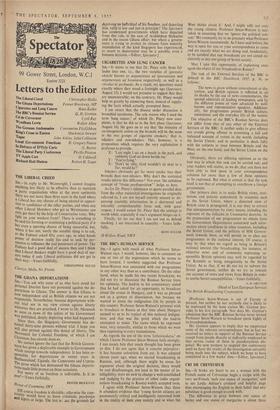THE BBC's RUSSIAN SERVICE
Sia,—I agree with much of what Professor Scton- Watson says. I would, however, like to comment on one or two of the impressions which he seems to have formed. I nowhere suggested that Professor Seton-Watson was associated with our programmes in any other way than as a contributor. On the other hand, when he made his two recent broadcasts, we did not try to dissociate the Russian Service from his opinions. The lead-in to his commentary stated that he had asked for an opportunity to broadcast about the events in Hungary, and it was so phrased not as a gesture of dissociation, but because we wanted to stress the indignation felt by people in this country. Professor Seton-Watson's personal wish to broadcast to Russia at that time about Hungary seemed to us to be typical of this national indigna- tion; and that was the point which the lead-in attempted to make. The views which he expressed were, very naturally, similar to those which we were then expressing in every transmission.
As regards the use of the term 'leiboristskaya,' on which I know Professor Seton-Watson feels strongly, I can assure him that much thought has been given to this. I do not agree that it remains pejorative: it has become colourless from use. It was adopted eleven years ago, when we started broadcasting in Russian, and, although there might be room for argument about the original decision, there would be real disadvantages, not least in the matter of in- telligibility, were we now to change a well-established and (judging by the practice of other radio organi- sations broadcasting to Russia) widely accepted term.
I agree with Professor Seton-Watson that there is abundant evidence that 'young Soviet citizens are passionately critical and intelligently interested both in the reality of their own society and in what the West thinks about it.' And, I might add, not only the young citizens. Professor Seton-Watson is mis- taken in assuming that we 'ignore the political con- text.' We constantly try to do precisely what Professor Seton-Watson recommends, As 1 have said before, the way is open for you or your correspondents to come and see exactly what we are doing and, incidentally, to be satisfied that our broadcasts are not aimed ex- clusively at any one group of Soviet society.
May I take this opportunity of explaining once again the object of our broadcasts to Russia?
The task of the External Services of the BBC is defined in the BBC Handbook 1957, p. 36, as follows :
The news is given without concealment or dis- tortion, and British opinion is reflected in all its shades by the use of news commentaries, the quoted editorials of leading newspapers, and by the different points of view advanced by well- known and representative speakers. Addition- ally, the programmes present British culture, institutions and the everyday life of the nation.
The objective of the BBC's Russian Service does not differ from that of any other of the External Services of the BBC. It neither seeks to give offence nor avoids giving offence in presenting a full and balanced account of events in the world, including the Soviet Union; and in particular it deals fully with the subjects at issue between Britain and the West, on the one hand, and the Soviet Union on the other.
Obviously, there are differing opinions as to the best way in which this task can be carried out; and your readers will realise, as we do, that you have not been able to find space in your correspondence columns for more than a few of these opinions to be expressed. But what is certain is that the task itself is not that of attempting to overthrow a foreign government.
Our primary duty is to make British views, insti- tutions and policies understood. In countries such as the Soviet Union, where a distorted view of British aims is propagated, it is our duty to correct this misrepresentation by every means, including the exposure of the fallacies in Communist doctrine. In the preparation of our programmes we obtain from the Government Departments concerned such infor- mation about conditions in other countries, including the Soviet Union, and the policies of HM Govern- ment towards them, as will permit us to plan our programmes in the national interest. Of course, it may be that what we regard as being in Britain's national interest (the broadcasting, for instance, of objective news and of comments expressing re- sponsible British opinion) may well be regarded by the Kremlin as being antagonistic to the Soviet Union, As to that, if we do not try to subvert the Soviet government, neither do we try to restrain our account of news and views from Britain in order to soothe Soviet susceptibilities.—Yours faithfully,
G. H. GRETTON (Head of East European Service) The British Broadcasting Corporation
[Professor Seton-Watson is out of Europe at present, but neither he nor anybody else is likely to be impressed by the lame excuse Mr. Gretton pro- vides in his first paragraph. Nor does Mr. Gretton's admission that the BBC Russian Service never invited Professor Seton-Watson to broadcast speak highly of its broadmindedness.
Mr. Gretton appears to imply that we suppressed some of the relevant correspondence; but in fact we received no letters in support of the Russian Service except from people directly or indirectly employed in that service (some of them in pseudonymous dis- guise). We now propose to suspend this controversy until we have the results of the investigation currently being made into the subject, which we hope to have completed in a few weeks' time.—Editor, Spectator.]
































 Previous page
Previous page